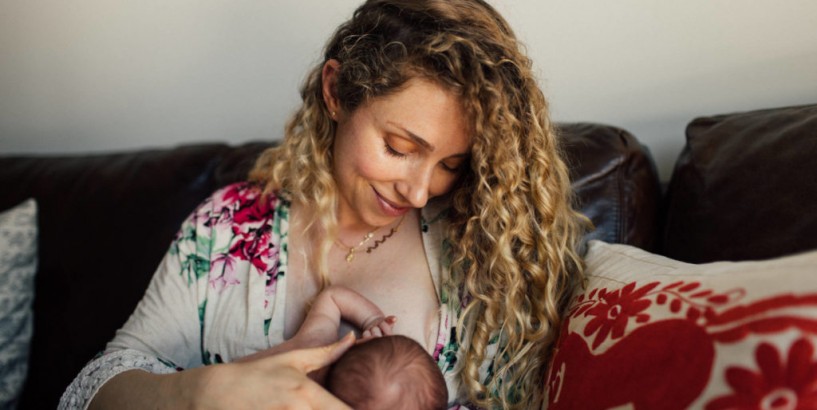Welcoming a new baby into the world should be a time of joy and excitement, but parents are now having to face the anxieties of social isolation and sheltering-in-place.
For parents already dealing with the challenges of a new baby, the additional challenges of the COVID-19 pandemic can be overwhelming. Due to social distancing measures to prevent the spread of the virus, they aren’t able to get the support that would normally be available to them.
“Honestly, it’s been super isolating,” said Emily Wolfe, who gave birth to her daughter, Grace, shortly before the first cases of coronavirus were confirmed in California. “We have a very supportive community, but they’re not able to be here.”
Grace was born four weeks premature on Jan. 23 and weighed just 3 pounds, so she had to remain in the neonatal intensive care unit for a month before her parents could take her home. Wolfe’s parents had planned to visit from Southern California but were forced to cancel their trip due to fears of infecting the new mother and child. Things became more dire when Wolfe’s sister, who had relocated from Texas to help out with the newborn, contracted COVID-19 and was unable to offer support, Wolfe said.
“We’re trying to do this Herculean effort alone in a way that just feels really unnatural,” she said.
Emily and Peter Wolfe have had to schedule several tele-medicine appointments with pediatricians and other consultants. (Courtesy Photo)
Wolfe has had to schedule tele-medicine pediatric visits and virtual meetings with other specialists. She scheduled several virtual meetings with Sarah Quigley, a lactation consultant, when baby Grace was having difficulty breastfeeding. Although these virtual meetings have limitations, like being unable to accurately weigh the baby to determine breast milk intake, both Wolfe and Quigley said it can be a comfort when nothing else is possible.
Quigley, who has 10 years of experience working with new mothers, said she is concerned parents aren’t reaching out for support at this time because they may feel overwhelmed. While normally she would conduct routine home visits with new parents to help with breastfeeding concerns, the switch to virtual consulting during shelter-in-place has created a sharp decline in parents scheduling her services.
“Babies are still being born, parents still need support,” Quigley said, “One thing that nobody really knows until they become a parent is how much you need to talk to other people who understand what you’re going through, and can encourage you.”
Lactation consultants not only offer practical help but also counseling services for parents’ emotional and educational needs, which Quigley is still able to provide virtually. This type of counseling is vital for new parents when they aren’t able to receive the support they would normally would get, Quigley said.
Postpartum depression and anxiety risks are also heightened during this time of uncertainty. Low social support and stressful life events are the top risk factors for mothers to develop symptoms for postpartum depression and anxiety, according to the National Institute of Mental Health. Nationally, 1 in 8 women experience symptoms and in some states it can be as high as 1 in 5 women.
Emily Wolfe said parenting a premature newborn during the coronavirus pandemic has been “super isolating.” “We have a very supportive community, but they’re not able to be here,” she said. (Courtesy photo)
“All new parents are experiencing heightened stress levels, because they’re so isolated because the birth experience is so different now,” said Dina Toy, a postpartum doula who is also offering virtual sessions for new parents. “What we’re going through in the COVID-19 is adding another layer of anxiety, so it’s nice for them to have somebody that they can turn to and that can offer them comfort during this time and be understanding about the issues that are that they’re experiencing.”
Toy, through her private practice, Fog City Doula, provides postpartum support to families after the birth of a baby, including emotional, physical and educational support to everyone in the household. Toy said she is trained to screen for signs of postpartum depression in new mothers and other members of the family.
Although the direct impact of the COVID-19 pandemic on postpartum depression rates is still unknown, specialists like Quigley and Toy are hoping that mothers and parents experiencing the isolating effect of sheltering-in-place will try to reach out for virtual support. The UCSF Women’s Health Resource Center, among others, is still offering prenatal and postpartum classes, albeit virtually.
For first-time mothers like Wolfe, being a parent during the coronavirus crisis has been challenging and disappointing at times.
“I spent so much time thinking about what this first year of being a mom would be like, and it’s so different, it just feels like these first few months are kind of stolen,” Wolfe said. “But I think in retrospect, once the hard, overwhelming part is over, it’s something we will look back on and we’ll be grateful, once the sleep deprivation has gone.”
mjohnson@sfexaminer.com
Bay Area News Coronavirus san francisco news
If you find our journalism valuable and relevant, please consider joining our Examiner membership program.
Find out more at www.sfexaminer.com/join/









